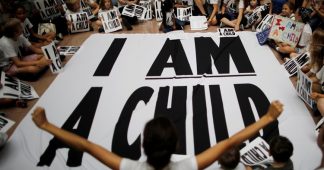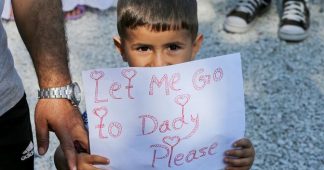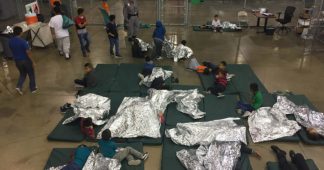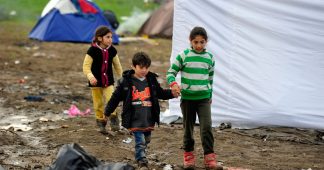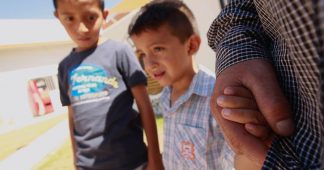By Meenakshi Jagadeesan
3 August 2018
Earlier this week, PBS stations around the country broadcast the new Frontline documentary, “Separated: Children at the Border.” Produced by Marcela Gaviria and Martine Smith, the film attempts to trace what happened to migrant children who were separated from their parents at the border, while exploring more generally the roots and impact of the Trump administration’s “zero tolerance” policy towards undocumented immigrants. Powerful in its depiction of the human costs of “zero tolerance,” the documentary is a timely reminder of what is at stake in the ongoing war on immigrants.
One focus of the documentary is the story of Arnovis Guidos Portillo and his young daughter, Meybelin. When we first meet Arnovis, he has already been deported back to El Salvador and has been separated from Meybelin for over a month. Arnovis, who is aware that his daughter is being held in a shelter in Texas, attempts to contact her while the cameras are rolling. He is brusquely informed, “She is not available right now,” and that he should “try again a few hours later.” As he shows the documentary crew his small one-room home and meager but carefully kept possessions, including Meybelin’s favorite dress and toys, it is impossible to miss his genuine love and grief.
The road that migrants take to reach the United States is a long and arduous one. For those from Central America, the first stage is to reach Mexico, and then jump aboard a running freight train, known simply as “The Beast.” As Sonia Nazario, the author of Enrique’s Journey, told Frontline, while there are occasionally some lovely moments with the migrants singing songs and children treating the journey as an adventure, the trip itself was incredibly harrowing.
Criminal gangs control the train and the train routes, robbing the already poor of what little they have. Resistance is met with brutal violence, with people being casually thrown onto the tracks. In addition to being robbed, women migrants also face being raped. Human Rights groups have stated that roughly six out of ten women who travel this route report being raped. Many in fact take birth control injections prior to making the journey, in order to prevent pregnancy.
Arnovis and Meybelin paid a smuggler to bring them across the US-Mexico border. Their journey was arduous. One part involved being packed in a trailer with other migrants, and locked up for 52 hours without any food except an apple and a cracker, and no access to bathrooms.
Having made it across, Arnovis and his daughter surrendered to the Border Patrol near McAllen, Texas, on May 26, 2018. Within 24 hours they were separated. Arnovis, who was told that he couldn’t be with his daughter since the bus taking her to a shelter was full, was not aware that he was now a victim of the “zero tolerance” policy that had been implemented by the Trump administration.
One of the important features of the documentary is that it actually traces the roots of this policy to the Obama administration. It is not usual to see shots of Obama being heckled by immigrant rights advocates or mention of his role as “deporter-in-chief” in mainstream media stories about “zero tolerance.” There is even a brief foray into how family detention centers were first put into place by Obama in the aftermath of the sudden surge in migration, particularly of unaccompanied minors, from Central America in 2014. While the administration defended this as a necessary step to prevent migrant hordes from swarming across the border, critics pointed out both the inhumanity and the illegality of the move.
Sonia Nazario told the producers that she was horrified by the extreme reaction of the Obama administration. And while there was indeed a surge in undocumented migrants crossing the border, that was to be expected given the increasingly violent conditions in Central America: “If your house is on fire, you are going to find a way to get out. And these children were finding a way to get out … We’re talking about 60,000 children who were apprehended by Border Patrol. I mean those kids wouldn’t fill a large football stadium in this country. I believe that we can handle that level of compassion.”
As for the detention centers that were set up by the Obama administration, Katie Shepherd of the American Immigration Council, who provided pro bono assistance to some of the detained immigrant families in Dilley, Texas, said: “There’s nothing ‘family’ about it … It looks like a large FEMA camp—high fences all the way around the facility. If you drive up to the detention center in Dilley from the highway, the center is actually recessed into the ground so you can’t even see [it] … It’s far away from robust legal communities and that decreases the likelihood that these people are able to get a meaningful day in court.”
The documentary reveals that far from being a sinister innovation that could only have been concocted by the Trump administration, the idea of separating families in order to carry out criminal prosecution of all undocumented immigrants was in fact formulated and discussed by the Obama administration. However, the producers quickly move on to note that this policy was not implemented then.
Ultimately, the family detention program was successfully challenged in the courts by immigration advocates who pointed out that the administration’s plan to detain children for over a year violated the Flores settlement that governs when and how children could be detained. In its last years, the Obama administration had to end its family detention program under court orders, but that infrastructure remained in place.
The callousness, inhumanity and utter disregard for well-established democratic and human rights norms manifested in the Trump administration’s policy of separating migrant children from their parents is beyond debate. Producer and interviewer Martin Smith is especially effective in forcing defenders to acknowledge that this is an especially vile practice. His interaction with Thomas Homan, the former acting director of ICE, is particularly notable in this regard.
Homan, like many supporters of the administration, begins by falsely claiming that family separation had been practiced for over three decades. When pushed by Smith about whether he had heard the heart-rending audio tape of a young child crying for her parents and begging to be at least united with her aunt, whose telephone number she had memorized, Homan brusquely tries to brush it aside, saying “No … I have heard many children crying in my 34 years. I do not need to hear it.” Smith then plays him the tape as the audience watches, forcing Homan to say that “it tugs at the heartstrings.” Asked how one could not condemn such a policy, Homan places the blame on the migrant parents for breaking the law. That claim is disingenuous at best.
Both US and international law allow for asylum seekers to cross borders without documents. The majority of those who make the difficult journey across the southern borders of the United States try to surrender to Border Patrol and intend to apply for asylum. Thus, to treat them as criminals is itself a blatant violation of US and international law. Furthermore, separating children from their parents is an even more egregious violation of well-established legal norms. The horrific scenes of children walking slowly, with the laces removed from their sneakers, towards cage-like structures, wearing what look like orange jumpsuits, and tales of how even babies were taken from their parents cannot help but underscore the brutality of the existing system.
In large measure due to the massive public outcry, the Trump administration was forced to officially end family separations as a policy. Under the pressure of court-ordered deadlines, a fraction of the detained children have been reunited with their families. But, as mental health professionals have pointed out, the effects of the trauma of separation will persist for a long time. Arnovis was reunited with Meybelin after 33 days. While he suffers from the guilt of having been powerless to stop his child from being taken away, Meybelin deals with her own anxieties. As Arnovis tells Smith, “It’s like she feels that her time with me is running out, like she’s afraid it could happen all over again.”
In the meanwhile, detention continues to be a reality for more than 700 children, who are yet to be reunited with their families. The conditions in the family detention facilities, already execrable when set up by the Obama administration, continue to deteriorate. Yesterday, 500 fathers and sons who had been separated from each other started a strike at the Karnes detention facility. The adults are on hunger strike, while the children refuse to participate in school activities. Many fathers, awaiting deportation, were in fact coerced into accepting deportation orders instead of pursuing justifiable asylum claims. They were told that their children would be separated from them for a few days, and for most, it has now been a matter of months. This strike is their desperate attempt to highlight their unjust treatment
